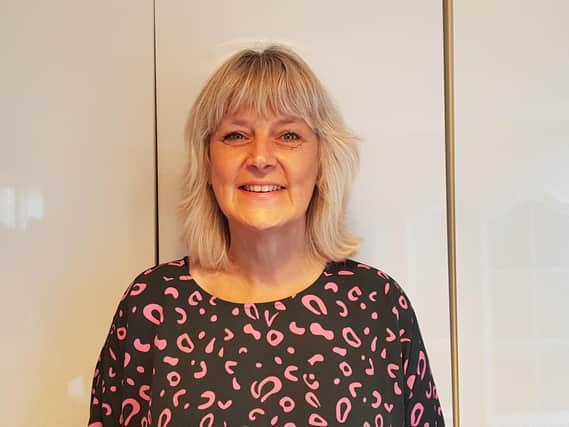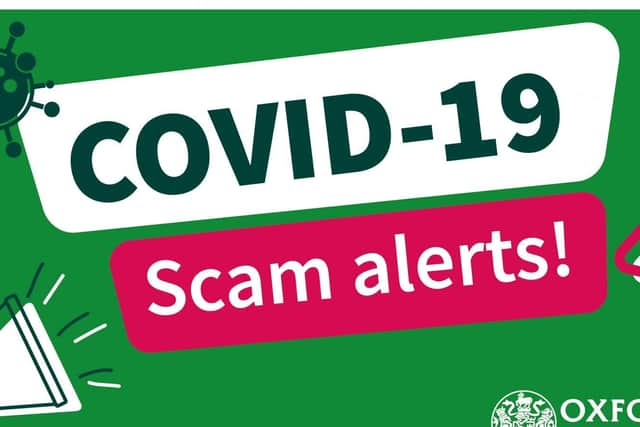Dynamic-duo from Oxfordshire Trading Standards helping warn residents of scams


‘Watch your back!’ That’s Shelley and Maryam’s message. They are two of Oxfordshire County Council’s community engagement officers.
They have a no-nonsense approach towards anyone attempting to scam local residents. But, in the current pandemic, they are also very careful to wear face masks, use hand sanitiser, and to social distance inside each property they visit.
Advertisement
Hide AdAdvertisement
Hide AdShelley, 55, from Wantage, is on a mission to warn every household about elaborate scams – many with a COVID-19 theme – designed to persuade people to unwittingly hand-over their money.


The fraudsters take many guises, from ‘Helga’, the 21-year-old Russian beauty who befriended a lonely pensioner, to ‘banks’ and ‘police’ menacingly demanding personal information through door-knocking and cold calls; Shelley and Maryam have seen all the tricks.
Shelley said: “It’s vicious and malicious. These scammers are criminals, robbing people of their lifesavings, if they can get away with it. They don’t care about the destroyed dreams and ruined lives. They’re simply motivated by greed.”
Shelley and colleague Maryam are employed by the county council to educate residents, making them aware of scams; a preventative strategy.
Advertisement
Hide AdAdvertisement
Hide AdThey also visit the most vulnerable, fitting call blockers, removing criminal access to home computers and arranging agency support from partners like Age UK.


It is challenging to stay one step ahead of criminals at the best of times, but with COVID-19, the task is even more difficult.
Shelley said: “During lockdown, we couldn’t visit most of the residents who we knew had been exploited.
"We had to ‘think outside the box’, arranging a letter campaign with tips and advice, including door stickers stating: ‘We won’t deal with unwanted traders. It is a criminal offence if you persist.’"
Advertisement
Hide AdAdvertisement
Hide AdAs COVID-19 restrictions eased, Shelley and Maryam were quickly back on the road, once again visiting residents, but now wearing face masks, using hand sanitiser, and careful to social distance inside each property.
Shelley said: “We’re passionate about the #Stopthespread campaign. COVID-19 safety comes first. We’ll never visit a property before first carrying out appropriate controls and ensuring we’re equipped with PPE, such as face masks.
“We’re also sharing important Health Protection Board advice that people should only use official NHS COVID-19 testing, booking online or calling 119. Not purchasing home kits or paying for private tests.”
Here are some of the scams Oxfordshire Trading Standards is aware of:
Advertisement
Hide AdAdvertisement
Hide AdBe aware of people offering miracle cures or vaccines for coronavirus – there is currently no specific treatment for coronavirus (COVID-19).
People impersonating healthcare workers, claiming to be offering ‘home-testing’ for coronavirus – this is a scam and these kits are not currently available to buy.
Emails offering a refund on council tax, utility bills, or similar are usually bogus and they are just after personal and bank details.
There are lots of fake products available to buy online that say they can protect against or cure coronavirus. These will not help and are designed to take your money.
Advertisement
Hide AdAdvertisement
Hide AdThere are new mobile phone applications that claim to give updates on the virus, but instead they lock your phone and demand a ransom.
People offering to do shopping or collect medication, asking for money upfront and then disappearing.
People offering home cleaning services.
Remember: Banks or the police will never ask for account details over the phone.
Tips to avoid being scammed:
Be cautious and listen to your instincts. Do not be afraid to hang up, bin it, delete it, or shut the door.
Advertisement
Hide AdAdvertisement
Hide AdTake your time; do not be rushed into making a decision that you will probably regret.
If someone claims to represent a charity, ask them for ID. Be suspicious of requests for money up front. If someone is trying to tempt you into accepting a service, they are unlikely to be genuine.
Check with family and friends before accepting offers of help if unsure.
If online, be aware of fake news and use trusted sources such as .gov.uk or NHS.uk websites. Type-out email addresses. Don’t click on links in emails.
Advertisement
Hide AdAdvertisement
Hide AdOnly purchase goods from legitimate retailers and take a moment to think before parting with money or personal information.
Protect your financial information, especially from people you do not know. Never give your bank card or PIN to a stranger.
Know who you are dealing with. If you need help, talk to someone you know or use the contact numbers provided below.
Contact information:
If you think you have been scammed, report it to Action Fraud: 0300 123 2040.
Advertisement
Hide AdAdvertisement
Hide AdIf you need advice, call Citizens Advice Consumer Helpline: 0808 223 1133.
If you are in immediate danger, contact the police on 999.
Contact your bank if you think you have been financially scammed.
Age UK runs a telephone support service (for older people and carers): 01865 411288.
To learn more about different types of scams and how to protect yourself and others, visit www.FriendsAgainstScams.org.uk and complete the free online training.